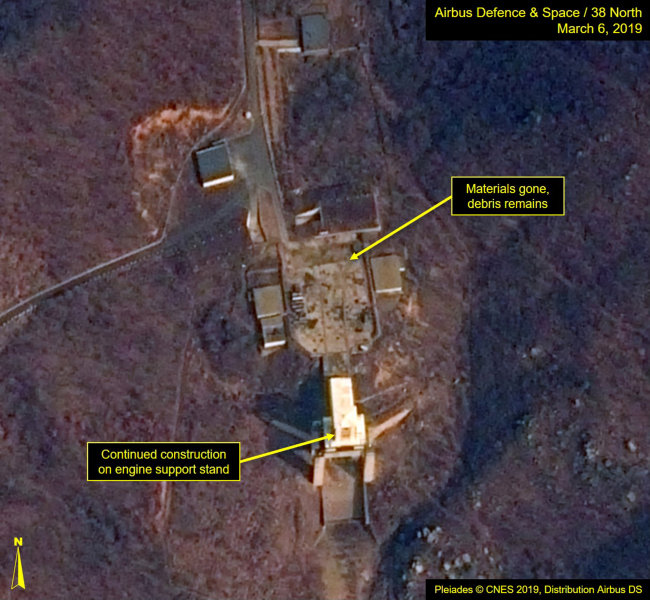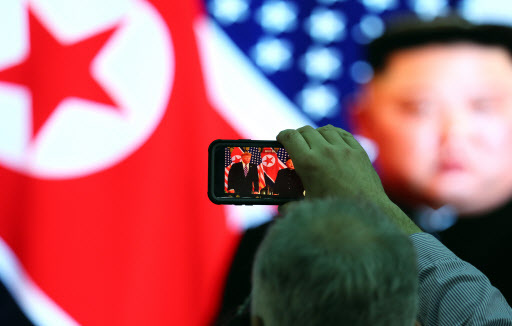US will ask N. Korea for clarification on missile site reassembly: official
By YonhapPublished : March 8, 2019 - 09:19
The United States is seeking clarification on the purposes of North Korea's reassembly of a key missile facility, a senior US official said Thursday as President Donald Trump expressed repeated disappointment over the activity.
North Korea began to rebuild parts of the missile engine testing site in Dongchang-ri in the runup to Trump's second summit with North Korean leader Kim Jong-un in Hanoi, Vietnam, on Feb. 27-28, according to two US think tanks earlier this week.
By Wednesday, commercial satellite imagery showed that the facility may have been restored to normal operational status following its partial dismantlement last year, they said.

Trump said Wednesday he would be "very, very disappointed" with Kim if the reports were true, and on Thursday added he was "a little disappointed" by Kim and the reported activity.
"So we're watching in real time, as you are, developments at Sohae and we will definitely be seeking clarification on the purposes of that," the State Department official told reporters on background.
Sohae Satellite Launching Station is the facility's formal name.
"The intent of the North Koreans in this matter is known only to them at this point. We don't know why they're taking these steps. We don't know what they intend to do with it," he said. "But suffice it to say we're watching closely and we expect them to abide by the commitments that they've made to the president of the United States."
Kim committed to dismantling the facility during his first summit with Trump in Singapore in June and again during his third summit with South Korean President Moon Jae-in in September.
In Hanoi, the summit ended without an agreement due to differences over the scope of North Korea's denuclearization and sanctions relief from the US

The official added that while Sohae should be destroyed as part of North Korea's denuclearization, it's not a critical part of the regime's nuclear infrastructure at this point because recent tests of intercontinental ballistic missiles were all carried out from mobile launchers outside the site.
"The sanctions remain in place," he said. And unless the North decides to denuclearize in exchange for a "very bright future," as laid out by Trump at the summit, "the pressure campaign will be maintained and if the president decides, the sanctions will be increased," he said.
Meanwhile, the official said, the United States still seeks North Korea's final, fully verified denuclearization before the end of Trump's term in early 2021 and believes it is feasible.
He elaborated that that includes the removal of all nuclear warheads, fissile material and ICBMs, as well as a permanent freeze on other weapons of mass destruction programs.
Going forward, it also means "moving them on a course to reorient their economy towards civilian pursuits in order to make this a permanent direction for their country," he said.
Citing the unique structure of North Korea's government, where all decisions must come from the top, the official said the North Korean negotiators need "much more latitude" on denuclearization than in the run-up to the Hanoi summit in order for the two sides to produce an agreement.
"But I'm confident that if they get that direction from the top of the North Korean government, we can make quick progress with them," he said.
"We are mindful that every day the challenge gets greater. The threat posed by North Korea is not going away, and we recognize that fact, but we're not going to be driven by any artificial timeline," he added.
Asked whether the US is considering sanctions exemptions for the resumption of two key economic projects between the Koreas, the official said without elaborating, "No."
Restarting the projects -- an inter-Korean industrial complex in North Korea's border city of Kaesong and a tour program to the North's Mount Kumgang -- is central to South Korea's vision to assist the regime's denuclearization through economic incentives. (Yonhap)



















![[Today’s K-pop] BTS pop-up event to come to Seoul](http://res.heraldm.com/phpwas/restmb_idxmake.php?idx=642&simg=/content/image/2024/04/17/20240417050734_0.jpg&u=)